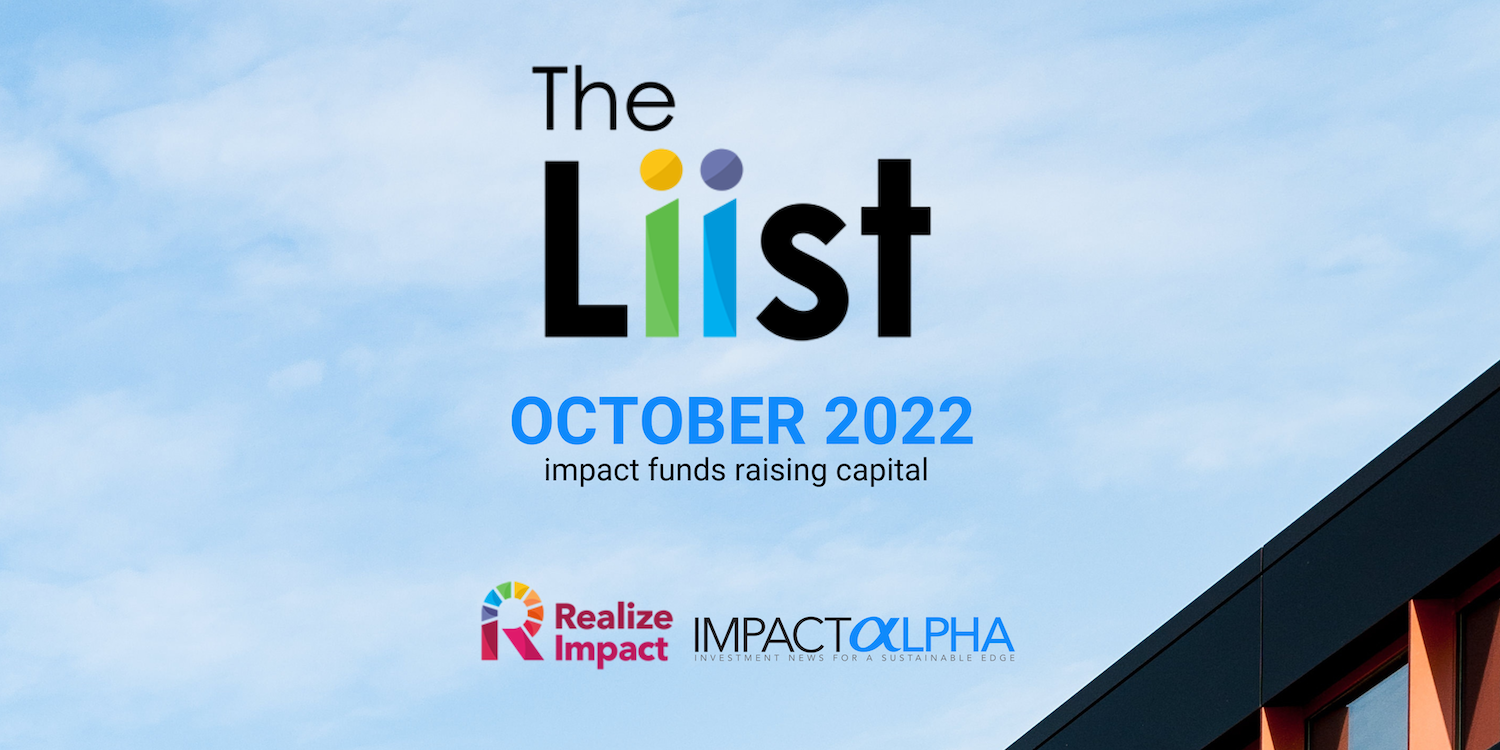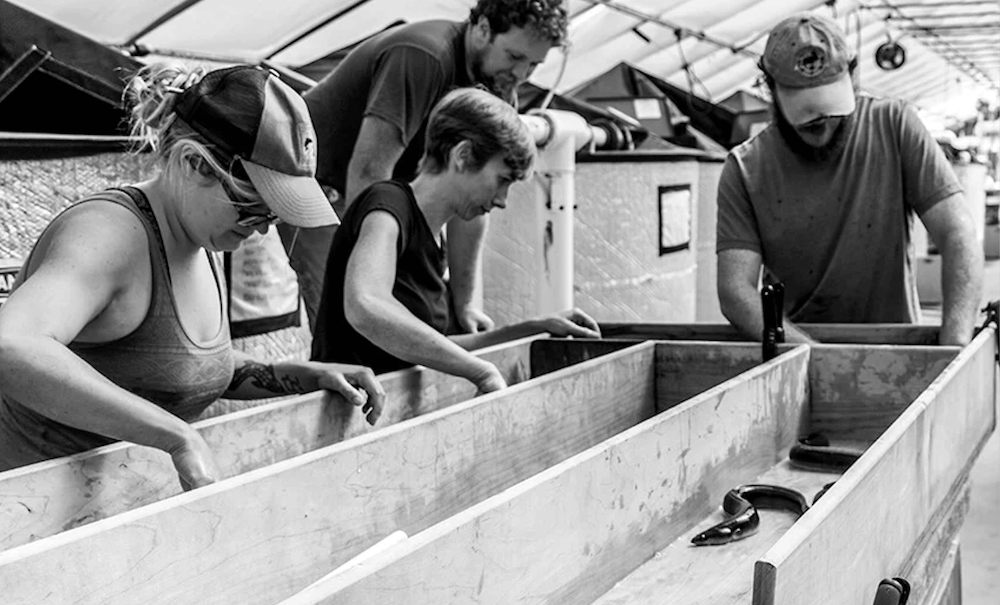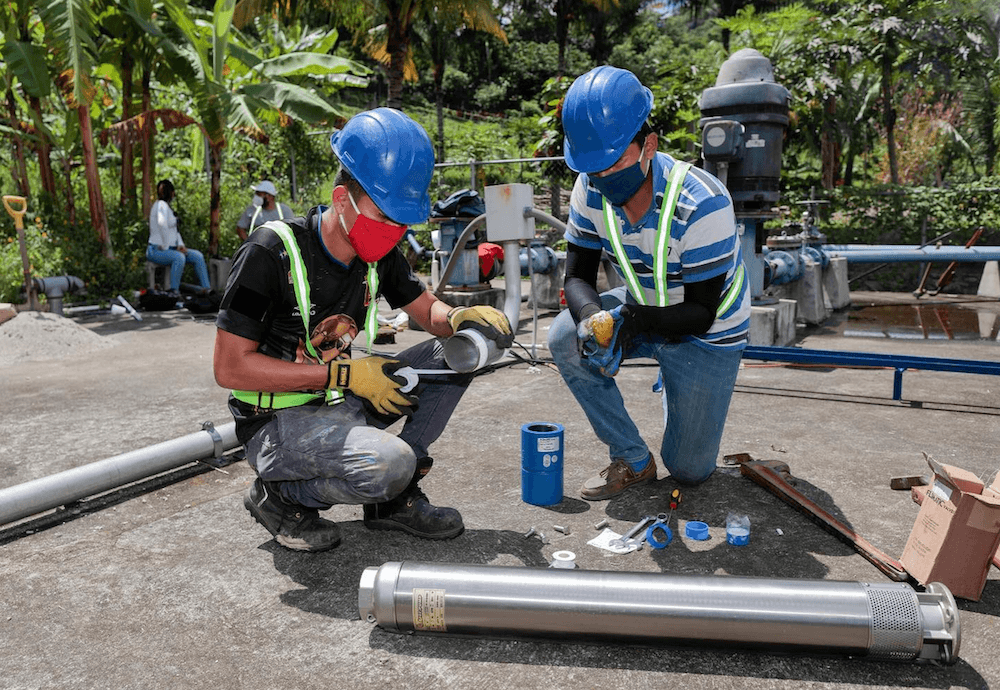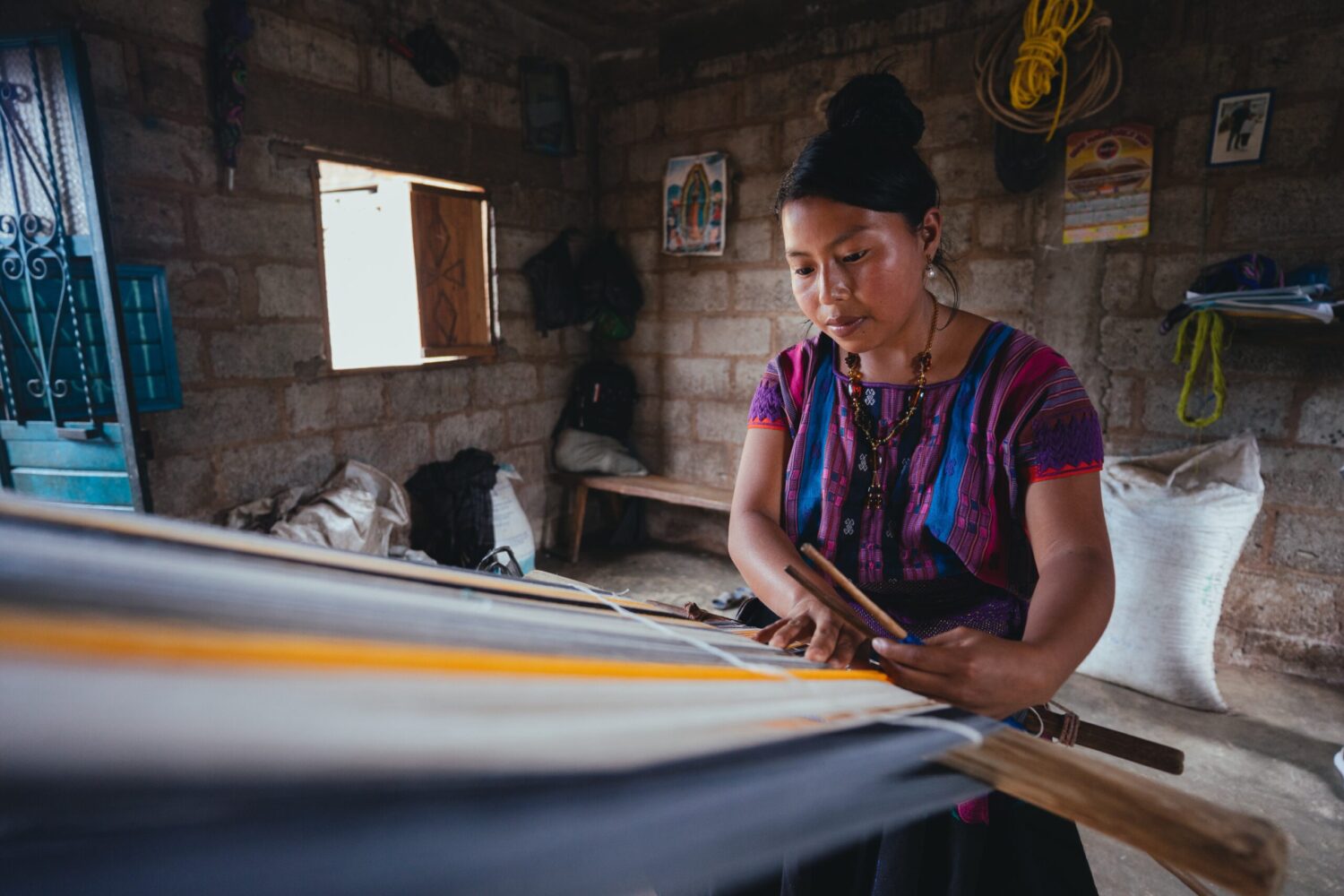ImpactAlpha, October 4 – On Last week’s Agents of Impact Call, we heard from first-time, women managers of small impact funds in emerging markets. The takeaway: Write the check.
Investment policies that exclude first-time managers exclude deep talent that may find value where other investors don’t know to look. Funds on this month’s edition of The LiiST, prepared with Realize Impact, include Alder Point Capital, founded by Chris Larson and other veterans of New Island Capital who have managed portfolios with hundreds of millions in assets. From Cape Town, Africa Trust Group’s Lelemba Phiri partners with other first-time, women managers to source deals and establish track records.
“We are overtrained and over-mentored and underfunded,” Phiri said on The Call. “We need the conversation to move from, ‘We believe in this and we think it’s something that can make a difference,’ to really putting your money where your mouth is.”
This month’s edition of The LiiST focuses on emerging markets impact funds, including a couple first-time, women-led funds. Funds are raising capital from the full spectrum of investors, from grantmakers and high net-worth individuals to family offices and institutional investors. Gender-focused Five35 Ventures in South Africa, has a portion of the fund set aside for non-accredited women and/or first-time investors.
- Mirova Sunfunder’s Gigaton Empowerment Fund (Clean energy; Africa, emerging markets)
- Alder Point Capital (Timberland and cropland; U.S.)
- Five35 Ventures (Tech; Africa, woman-led)
- Africa Trust Group Enygma Ventures Fund (Tech and small businesses; Africa, woman-led)
- Echo River Capital’s Fund I (Water tech; global)
- Africa Eats (Agrifood; Africa)
- Realize Impact and Sprout Enterprise’s R.I.S.E. artisan fund (Artisans, creative economy; emerging markets)
Disclosure: Luni Libes, founder of Africa Eats, is also founder of Realize Impact, ImpactAlpha’s partner in The LiiST. Realize also is a partner with Sprout Enterprise in the R.I.S.E. fund. Realize Impact helps holders of any donor-advised fund make impact investments through “philanthropic investment grants.” As recommended by donors, Realize Impact has invested in some of the funds and companies included in The LiiST, as noted below.
Disclaimer: The LiiST and this post are based on available information, have not been further reviewed by the managers nor verified by third parties, are not guaranteed for accuracy or completeness, and should not be relied upon as investment advice or recommendations. Nothing in The LiiST this post or on ImpactAlpha.com shall constitute an offer to sell or the solicitation of an offer to buy securities.
SunFunder more than a decade ago spotted a significant roadblock in the race to reduce energy poverty in Africa through clean energy access: financing for clean energy companies. Ventures selling solar lighting products and systems to mostly low-income consumers needed debt capital in order to offer their customers pay-as-you-go loans.
Sunfunder, with offices in Paris, London and Nairobi, has financed more than 60 solar energy companies in Africa. Last year it merged with Mirova, the $27 billion unit of French global asset management firm Natixis Investment Managers. The strategy: ramp up clean energy access in emerging markets via a Gigaton Empowerment Fund (see, “Mirova acquires Sunfunder to expand clean energy and climate investing in emerging markets”).
- Blended finance. Mirova Sunfunder’s Gigaton Empowerment Fund is looking to raise $500 million from junior, senior and “super senior” investors. It aims to make 130 investments that impact more than 10 million people and cut carbon and carbon-emission equivalents by 18 million tons. Mirova SunFunder can be reached at [email protected].
Alder Point Capital was formed this year by three veterans of New Island Ventures to offer investors a twist on sustainable real assets: climate-resiliency. “We’ve been realizing over the last 10 years that these assets are being exposed to more and more climate risk,” Alder Point Capital Management’s Chris Larson told ImpactAlpha.
The firm is looking to raise a $200 million fund to invest in sustaining and protecting income-producing timberland and cropland in climate-resilient regions of the U.S., like the Pacific Northwest. Alder Point’s strategy involves finding good operators and making improvements to operations, like electrifying farms so they no longer rely on diesel-powered water pumps.
“Even in these relatively climate-resilient regions, there’s a lot of adaptation and resilience investment that we need to make in order to ensure that we can still grow enough food in this country,” Larson said.
- The full story. Read, “Alder Point Capital aims to make sustainable real assets climate-resilient as well,” on ImpactAlpha.
Hema Vallabh launched Five35 Ventures to make the road a little less lonely for other women in tech. Vallabh has supported women in STEM at various points of their careers. South Africa-based Five35 Ventures invests in early-stage tech startups founded by and for women in Africa. Its early portfolio includes money transfer app MaxiChase; Motherbeing, an online portal for women’s and maternal health; and agtech venture Complete Farmer, which primarily supports female farmers.
The fund is looking to raise $30 million and will cut checks of $100,000 to $500,000. That adds up to a lot of deals. “I really want to dispel this myth that there aren’t enough female founders,” Vallabh told ImpactAlpha.
- Open for business. Five35 Ventures closed its first $1 million last year. The Mauritius-based fund is raising from high net-worth individuals and institutional investors. A portion of the fund is open to women and/or first-time investors, who can invest as little as $35,000. Vallabh can be reached at [email protected].
- Learn more. “How women-led funds in South Africa are unlocking capital for women and small,” on ImpactAlpha.
South Africa-based Africa Trust Group was founded by Lelemba Phiri to address a problem she first experienced as an entrepreneur: lack of women in business leadership and decision-making. The venture fund invests in seed-stage, women-led companies with a goal of helping female founders graduate to later-stage capital rounds.
“The drop-off of women entrepreneurs between the seed and Series A stages is massive,” Phiri told ImpactAlpha. Her firm has raised $10 million so far for its Enygma Ventures Fund, which is domiciled in Delaware, U.S. and invests in east and southern Africa.
Africa Trust Group partners with other women-led funds as a pipeline-building strategy. It pays commissions for successful deals, which helps other fund managers build track records while easing Africa Trust Group’s fund management costs.
- Seed fund. Africa Trust Group has an earlier-stage capital pool to build the firm’s investment pipeline and experiment with investment structures to support entrepreneurs in their earliest days. Such structures “impact the business’s unit economics, particularly for smaller, riskier businesses,” Phiri explains. The vehicle has been seeded with $300,000 in grant funding from the Shell Foundation. Phiri can be reached at [email protected].
- Learn more. “How women-led funds in South Africa are unlocking capital for women and small,” on ImpactAlpha, which also features South Africa-based Womvest, an angel-backed debt fund; revenue-based finance fund Linea Capital; and tech commercialization fund Makoti Kekana Capital.
Echo River Capital is addressing global water issues by investing in new technologies that aim to “digitize, decarbonize and decentralize the water cycle to improve human health, the environment and climate resilience.” The global water and wastewater market is nearly $900 billion annually (for context, see, “Water deals flow amid droughts and storms“). The San Francisco-based venture fund has made pre-seed and seed-stage investments in a dozen tech ventures that are addressing water issues in agriculture, consumer goods, energy and utilities, industry and real estate. Epic Cleantec is a distributed wastewater treatment provider for the real estate industry. Gybe provides remote sensing of lake water quality for global food and beverage companies. Voda.ai is providing predictive analytics to help water utilities prevent pipeline breaks.
- Entrepreneur to investor. Echo River was started by water tech entrepreneur Peter Yolles, whose venture WaterSmart.com provided predictive water usage analytics for utilities. The company was acquired by Vertex One, a utility billing software provider, in 2020. Echo River hit a $3 million first close for its inaugural fund in April. The firm is looking to raise a total of $10 million. Echo River can be reached here.
Africa Eats launched in year-TK with a mission to reduce food insecurity and poverty on the African continent. The last place on Earth where you’ll find a billion people still dealing with daily hunger and subsistence-level poverty is Africa,” says Africa Eats founder Luni Libes. “The solution to both isn’t philanthropy, it’s investments” (disclosure: Libes is also founder of Realize Impact, ImpactAlpha’s partner in The LiiST). Africa Eats is part venture fund, part business accelerator, “with a bit of Berkshire Hathaway mixed in,” explains Libes. It invests in homegrown, for-profit startups that are improving Africa’s agrifood supply chains, supporting smallholder farmers, and ushering goods to retailers. The effect is more and more reliable income for farmers, reduced food waste, and lower-cost food for consumers.
- Portfolio companies. Africa Eats has supported two dozen African companies, which generated a combined $16.8 million in revenues in 2021. They include farmer to consumer logistics venture East Africa Fruits in Tanzania, sustainable honey producer Kalahari Honey in Botswana, and clean cookstove maker Obamastove in Ethiopia.
- Open for business. The company has raised $6.7 million to date and is looking to surpass $10 million. Libes can be reached at [email protected]. (Note: Through another venture, Realize Impact, Libes works with ImpactAlpha to produce The LiiST.)
Realize Impact joined forces with artisan network Sprout Enterprise on an initiative that is supporting the livelihoods of artisans in emerging markets communities with few economic opportunities. The partners’ R.I.S.E. Fund makes debt and equity investments and offers revenue-based financing to early-stage enterprises supporting local artisans while also operating sustainably, empowering women and addressing climate impacts. It has leveraged $1.6 million in grants and donations to support artisan organizations in India, Mexico, Guatemala, Cambodia, Indonesia and Pakistan that are impacting more than two million people. Most of its pipeline comes from Sprout’s network. The open-ended fund aims to exit investments within five years and to recycle capital into new deals.
- Flexible finance. Portfolio companies use loans and recoverable grants from R.I.S.E. for working capital needs, to acquire assets for their business, and as purchase-order financing to cover production costs for wholesale buyers. “Blended capital is used to build more effective sales distribution, more efficient operations and more timely reporting, improving the enterprises’ financial sustainability and impact in their communities,” the partners say.
- Open for business. U.S.-domiciled R.I.S.E. Fund is an open-ended fund that seeks donations, grants and loans. The Social Impact Pulse podcast hosted six recent conversations with R.I.S.E. fund and entrepreneurs that it’s supporting. For more information, Ellen Fish, R.I.S.E.’s director, can be reached at [email protected].











